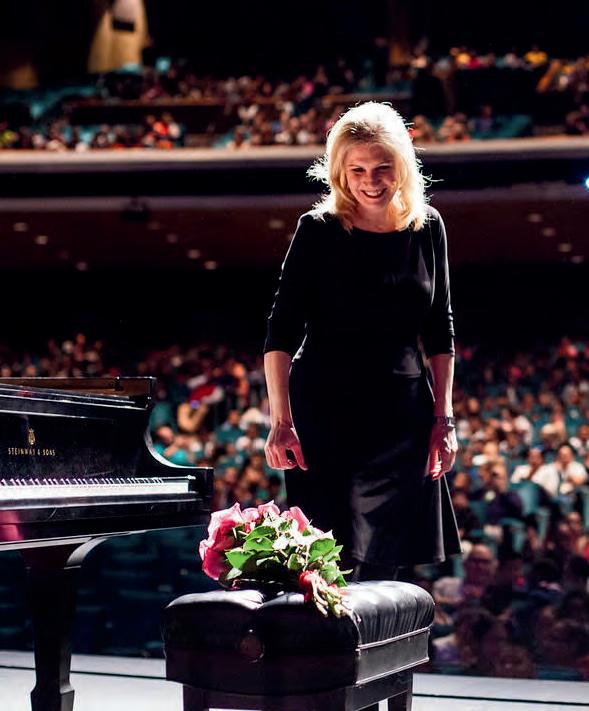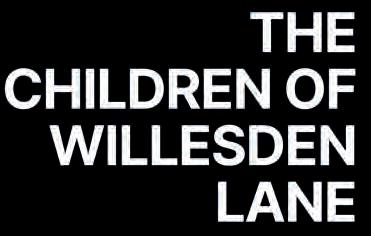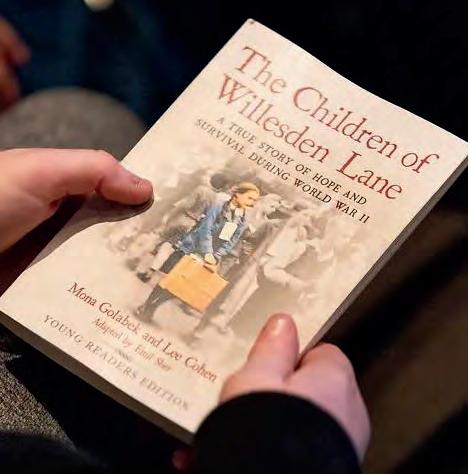The Jewish Press









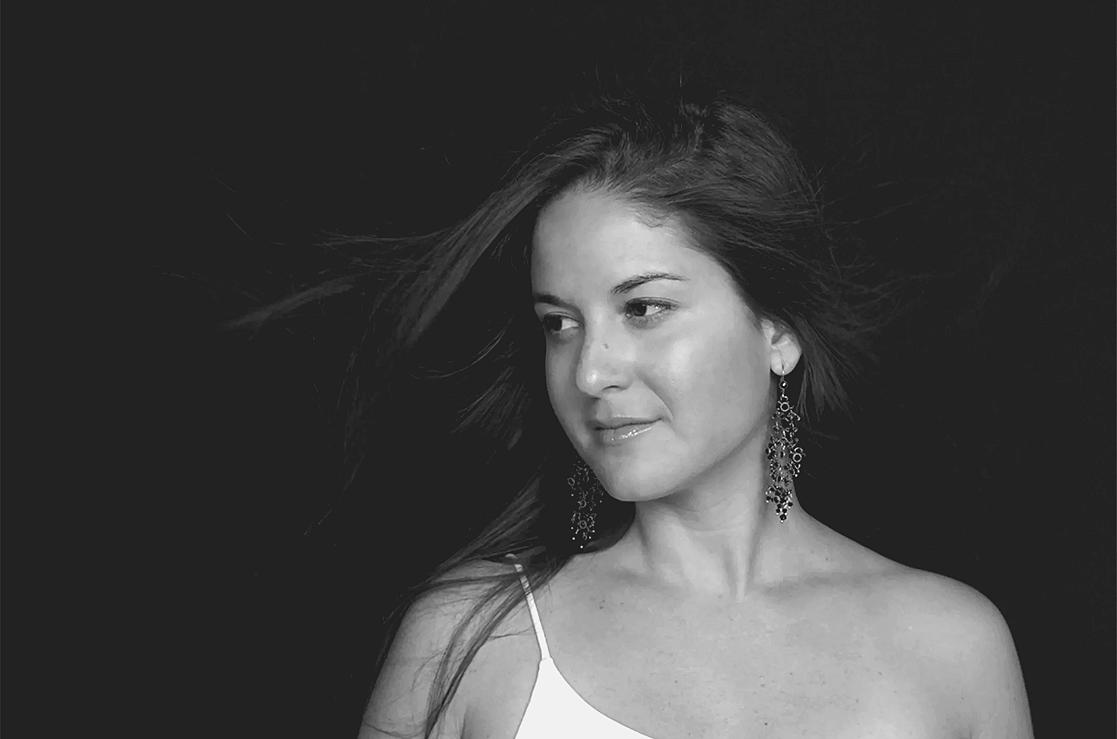
The Jewish Federation of Omaha is excited to invite you to the 2024 Spring Women’s Event!
Please join us for tea, scones and songs, Sunday April 7 from 4-6 p.m. at Joslyn Castle.
Bewitched, celebrating Jewish Women of The Great American Songbook, is performed by Hadar Orshalimy. Chairs of the event are Terri Zacharia, Jamie Friedland, Patty Nogg and Jaime Nogg.
“It has been said that being social is good for your health,”
This article was first published by Midwest Real Estate News and is reprinted with permission.
Each year, Midwest Real Estate News inducts a new class into its Commercial Real Estate Hall of Fame. Here is a look at the busy career of one of our newest members, Bennett Ginsberg, managing director with the Omaha, Nebraska, office of CBRE.
Experience matters. So does knowledge and hard work. And an innate ability to close deals and meet the needs of clients? That, too, is critical for success in commercial real estate.
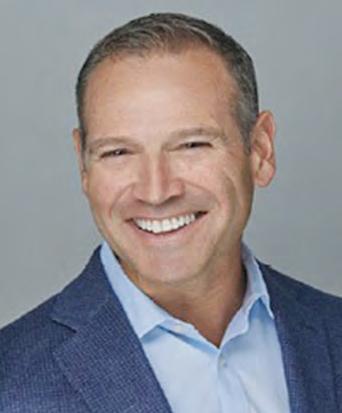
Fortunately, Bennett Ginsberg, managing director with the Omaha office of CBRE, possesses all those traits. It’s why he’s long been considered a go-to expert in Omaha’s commercial real estate market.
Ginsberg has worked in commercial real estate for more than 35 years. His peers say that this industry veteran holds a deep knowledge of the industry, is enthusiastic about serving his clients and community and See Bennett Ginsberg page 3
Terri Zacharia said. “Here is your chance! What could be better than being surrounded by a group of women who support our community while enjoying a very relaxing and entertaining time together?”
Jamie Friedland agreed: “People should attend, because Hadar Orshalimy will be worth seeing. She will perform with her jazz trio and highlight female Jewish songwriters of the American songbook. It will be a great event. You won’t want to miss this!”
Born and raised in Tel Aviv, Hadar’s early singing career See Spring Women’s Event page 2
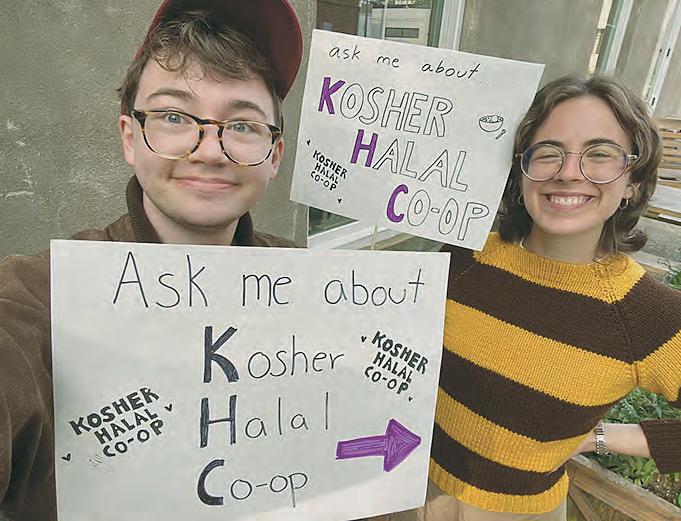
After high school, Friedel Jewish Academy graduate Ilana McNamara traded Omaha for Oberlin College, where she is currently a senior.
“As an incoming college student, I had a lot of the normal fears sur-
rounding food,” Ilana said. “Where will I eat? Will I be able to find healthy options? Will the food actually taste decent? And most concerning of all, who will I eat with? I was very overwhelmed by the prospect of having to eat in a huge, impersonal dining hall with people See Koshe and Halal page 2
Continued from page 1
that I didn’t know. But as I perused the options, one stuck out to me: a place where I could practice my religious dietary restrictions, a small environment where I would know everyone that I was eating with, in a beautiful building with people of different faiths. The KosherHalal Co-op was obviously the place for me.”
Norman Birnbach is an Oberlin alumnus, and in the mid 1980s was a member of the then-Kosher Co-op.
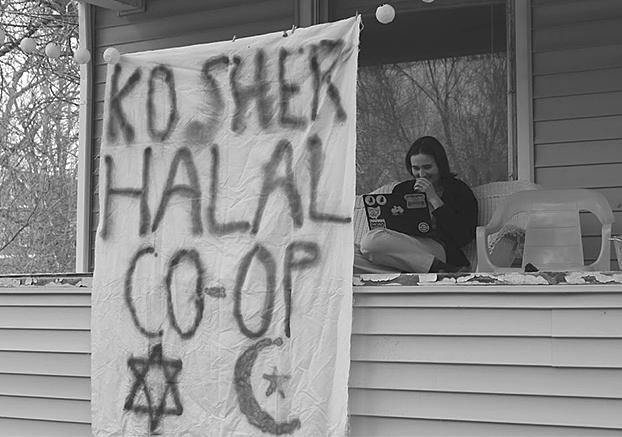
“The Co-op had been around since 1972,” he said, “and evolved into the Kosher Halal Co-op in 1995, providing students who follow kosher or halal rules with a place to eat on campus that served appropriate foods.”
“KHC was one of the first places to really welcome me to college,” Ilana said. “KHC is an important Oberlin institution and is the only student-run dining co-operative in the world to specifically provide for both kosher and halal dining. KHC was shut down in 2020 with the pandemic, and has not been allowed to reopen since then. For the past four years, I’ve worked with other students and alumni to bring KHC back, which culminated this January when we had a fully operational dining co-op with about 35 members: Muslim, Jewish and otherwise. Especially right now, interfaith community and collaboration is more important than ever, and I believe that KHC is a really beautiful and meaningful example of this.”
For the past one-month Winter Term at Oberlin, in which
students must complete some sort of personal project, Ilana, the last student on campus to be involved in the Kosher Halal Coop, finally found a way with alums, including archivist and ‘23 graduate Elliot Diaz and the Oberlin Student Cooperative Association (OSCA), to re-create the Kosher Halal Coop. “At least for one month,” Birnbach said, “30 students cooked, ate and talked again. Much of this is due to McNamara and Diaz, who led the project and raised the funds, aided by some alumni.”
Organizers are now trying to make this co-op permanent once again.
“People see each other more as full human beings,” Diaz said. “They’re approached with a lot more grace and a lot more care because these are the people that you’re cooking lunch with and the people you’re seeing at dinner tomorrow.” That, he said, makes conversations that cause conflict on other campuses go a little easier at Oberlin.
“I feel like it’s the most important thing that I’ve worked on during my time at college,” Ilana said, “and I’ve learned more through the process of figuring out how a co-op that keeps both halal and kosher works than in many of my academic classes.”
This article used source material from Ilana’s blog, which can be found at https://www.oberlin.edu/blogs/kosher-halalco-op-back-baby
Continued from page 1
began with appearances on national Israeli television, radio and sporting events, including the first season of Israeli Idol. After completing her IDF service, she spent two years at the Rimon School of Jazz and Contemporary Music in Tel Aviv.
After that, she completed her degree at Berklee College of Music in Boston, where she graduated with honors. From biological and chemical warfare defense trainer, to contemporary Jewish music touring artist, to singing jazz standards for Barack Obama and performing at the United Nations, this New York City-based vocalist and songwriter has one of the most diverse and interesting career trajectories in the music business today. Hadar sheds a light on Jewish women’s contributions to the most iconic songs in history and tells their often unheard and underappreciated stories. In doing so, she especially focuses on Jewish values and the chutzpah that made these women successful. To hear a preview of her music, please check out hadarmusic.com
“You can watch the concert, catch up with friends and reconnect,” Jamie said. “Plus, tea and scones! What’s not to like?”
“I am excited to see women whom I have not seen or talked to in a while.” Terri added. “It will be nice to catch up with them and find out what is happening in their lives. I also look forward to making new friends. Besides, if you have never been there, Joslyn Castle is a very interesting venue. It is a historic mansion located in the Gold Coast historic district in Omaha. The Castle was built for Sarah and George Joslyn in 1903. It was designed by John McDonald, a local architect. The house totals 19,360 square feet.”
This event is made possible through the generosity of the Karen Sokolof Javitch Music Fund, the Ruth Frisch and Oscar S. Belzer Endowment Fund, the Byron Milder II Memorial Fund and the Foundation IMPACT Grant.
Reservations are due by April 1; cost is $36 per person, and the food is provided by Star Kosher Catering. Please make checks payable to the Jewish Federation of Omaha or scan the QR code to register and pay online.
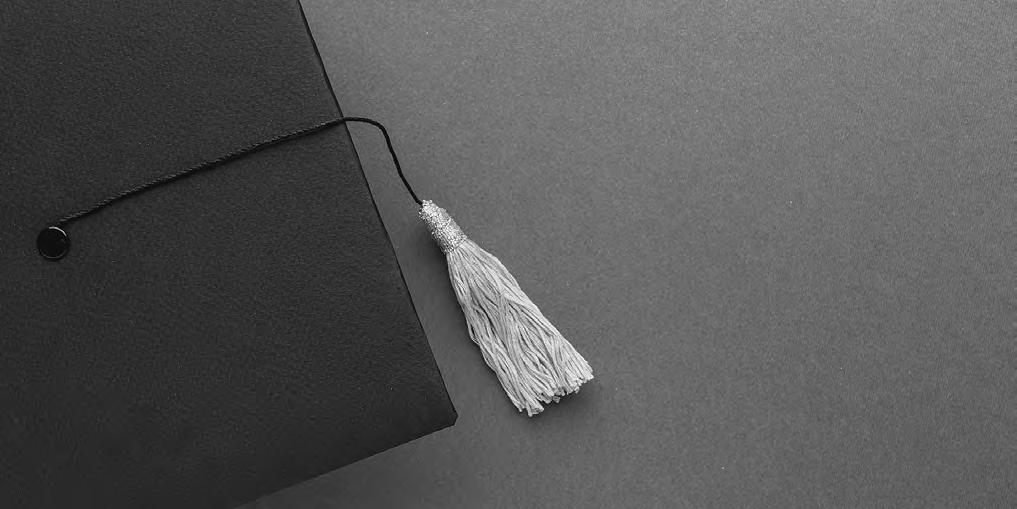
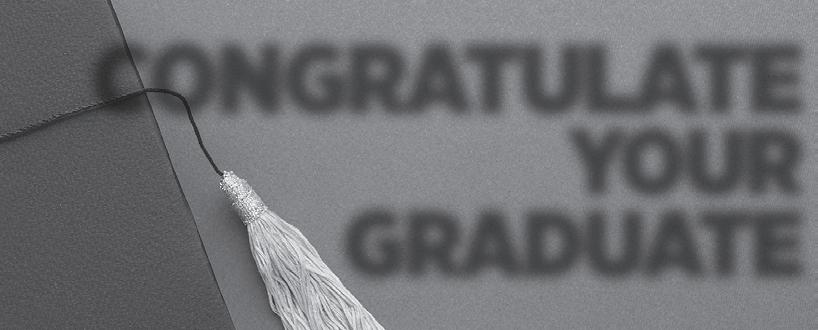
JTA
Israeli Prime Minister Benjamin Netanyahu downplayed differences between him and President Joe Biden Monday, saying they “agree” on the goals of the war, while Biden emphasized U.S. efforts toward humanitarian aid and a ceasefire in Gaza.
The most recent remarks by both leaders — Netanyahu’s in a Fox News interview, Biden’s in a statement marking the start of the Muslim holy month of Ramadan — come following a weekend of sniping. Biden had accused Netanyahu of “hurting Israel more than helping Israel,” while Netanyahu shot back that the president was “wrong” and that he was advancing “policies supported by the overwhelming majority of the Israelis.”
Both men also commented on a quip by Biden, caught on a hot mic following his State of the Union address last week, that he and Netanyahu would have a “come to Jesus” conversation. Biden explained that it meant “a serious meeting,” adding, “I’ve known Bibi for 50 years and he knew what I meant by it.”
Netanyahu confirmed that assumption, telling Fox News that he took the idiom to mean a “heart-to-heart conversation,” which he said they had had “plenty of times.”
The two leaders’ statements come amid fears that clashes could spread across Israel during Ramadan, a period that has historically seen spikes in violence in Jerusalem. Meanwhile, American-mediated talks toward a temporary ceasefire and hostage release in the Israel-Hamas war have stalled while Israel prepares for an invasion of Rafah, in southern Gaza. Both men are also in a precarious position domestically. Biden is facing domestic blowback over the Gaza war that could hurt his chances in this year’s presidential election, while Netanyahu’s support has plummeted in Israel since Oct. 7, when the war began with Hamas’ invasion of Israel, which killed some 1,200 people, mostly civilians.
Biden staunchly supported Israel at the outset of the fighting. In an interview with MSNBC on Saturday, he reiterated that he still supports Israel’s war effort but urged it to make a greater effort to protect civilians. More than 30,000 Palestinians have been killed in the war, according to Gaza’s Hamasrun health ministry, a figure that is not verifiable and includes both civilians and combatants. Israel says roughly 40% of the casualties are combatants.
“He has a right to defend Israel, a right to continue to pursue Hamas, but he must pay more attention to the innocent lives being lost as a consequence of the actions taken,” Biden said of Netanyahu. “He’s hurting Israel more than helping Israel… It’s contrary to what Israel stands for and I think it’s a big mistake.”
Biden warned Israel against invading Rafah, a city in southern Gaza that has become a focal point in the conflict in re-
Continued from page 1 quickly garners the trust and respect of both his industry peers and clients.
These traits are why the biggest and most respected companies have long trusted Ginsberg with their real estate decisions.
Throughout his long career, Ginsberg has focused on integrity: He does what he says he is going to do. And he never forgets the needs of his clients when closing deals.
“A high degree of integrity is absolutely necessary in business and life,” Ginsberg said. “A quote that I like using is that ‘business moves at the speed of trust.’”
This doesn’t mean that Ginsberg hasn’t faced challenges. He has. But he’s also worked hard to overcome them.
He says that the biggest challenge he faced during his career was the 2008 financial crisis. But even though those were difficult times, Ginsberg and his team persevered thanks to hard work, honesty and dedication to their clients.
“I’m proud to say we never let one person go during that couple of years of a very difficult business climate,” he said. What Ginsberg describes as a positive challenge occurred in 2000. That’s when he played a key role in and oversaw a strategic alliance with CBRE, Inc. This aligned CBRE|MEGA
The award-winning B’NAI B’RITH BREADBREAKERS speaker program currently meets Wednesdays via Zoom from noon to 1 p.m. Please watch our email for specific information concerning its thought-provoking, informative list of speakers. To be placed on the email list, contact Breadbreakers chair at gary.javitch@gmail.com
cent weeks. Rafah is crowded with more than a million refugees, but Israel says that the city is Hamas’ last bastion in the enclave. The United States has urged Israel to allow civilians to evacuate the city before an invasion begins.
Asked about an Israeli invasion of Rafah, Biden said it was “a red line, but I’m never going to leave Israel. The defense of Israel is still critical, so there’s no red line [where] I’m going to cut off all weapons so they don’t have the Iron Dome” missile defense system.
Biden said he was prepared to visit Israel to speak directly to the Knesset to push for a ceasefire, but declined to say if there had been any discussions with Israeli leadership about a visit. The president visited Israel in October, shortly after the Hamas attack.
He also elaborated on his “come to Jesus” comment.
Netanyahu bluntly rejected Biden’s criticism. In an interview on Sunday, he said he wasn’t sure what Biden meant but “if he meant by that that I’m pursuing private policies against the majority, the wish of the majority of Israelis, and that this is hurting the interests of Israel, then he’s wrong on both counts.” Netanyahu also rejected Biden’s warning against military action in Rafah, saying Israeli forces intended to move into the city. A recent poll by the Israel Democracy Institute found that more than 60% of Israelis support military action in Gaza.
“You know what the red line is? That Oct. 7 doesn’t happen again,” Netanyahu said in the interview, which was conducted by German media company Axel Springer and published in Politico.
In his interview Monday morning on Fox News, Netanyahu stressed that Hamas’ military capabilities must be completely dismantled to prevent another Oct. 7-style attack, which Hamas has vowed to repeat. But he softened his criticism of Biden, saying that they were in agreement about the war’s goals, but had “disagreements about how to achieve them.”
“The president and I have agreed that we have to destroy Hamas,” Netanyahu said at the outset of the 11-minute appearance on “Fox and Friends,” asked about Biden’s comment regarding red lines. “If the president means by that that we should first enable the safe departure of the civilian population of Rafah before we go in, we agree with that.”
But Netanyahu did warn that divisions between Israel and the United States harmed the war effort and hostage negotiations.
“To the extent that Hamas believes that there’s daylight between us, that doesn’t help,” he said.
In a statement marking the start of Ramadan, meanwhile, Biden said the month was beginning “at a moment of immense pain.” The president said the United States would continue to lead efforts to bring humanitarian aid into Gaza and work for a six-week ceasefire as well as a two-state solution.
with one of the largest and most respected full-service commercial real estate companies in the world.
After a long history of partnership between CBRE|MEGA and CBRE, CBRE agreed to purchase CBRE|MEGA in July of 2019. Today, CBRE is the only corporate commercial real estate company in the Omaha area.
Ginsberg continues to guide CBRE with his proven leadership style. Under his watch, CBRE has been involved with some of Omaha’s most distinguished projects, including the TD Ameritrade World Headquarters, Gavilon Trading headquarters in downtown Omaha and the 500-acre Heartwood Preserve development in western Omaha.
When not working, Ginsberg enjoys golfing with his close friends and taking great golf trips with them and trying to stay healthy and active by working out and riding the Peloton bike. He also enjoys cooking, especially smoking a wide variety of meats on his smoker, always trying to master the art of making the perfect brisket.
But as with most successful commercial real estate professionals, work is also a passion of Ginsberg’s.
“I enjoy working on complex deals,” he said. “Each one is so unique. I believe you need to be able to adapt to each one to achieve the desired outcome for your client.”
If you encounter an antisemitic or other hate incident, you are not alone. Your first call should be to the Jewish Community Relations Council (JCRC) in Omaha at 402.334.6572, or email JCRCreporting@jewishomaha.org. If you perceive an imminent threat, call 911, and text Safety & Security Manager James Donahue at 402.213.1658.











After the successful showing of Escape from Treblinka: The Joseph Polonski Story; the Polonski family has graciously allowed the IHE to stream their film for you to watch. You can find the link on our website at www.ihene.org
While you are there, click on the link for Nebraska Survivor Stories.
Each story is different and has their own lessons to be learned. The IHE is fortunate to have many stories from Holocaust survivors that ended up in Nebraska. Although the memories are painful, each survivor has given their testimony in order to help spread awareness and ensure the lessons of the Holocaust are never forgotten.
The Institute of Holocaust Education (IHE), the Jewish Community Relations Council (JCRC), and the Jewish Federation of Omaha (JFO) are joining forces to bring an impactful and inspiring program to Omaha area middle school students and the community on March 28, 2024 at the Holland Performing Arts Center.

Nearly 2,000 local middle school students from 17 area middle schools are currently registered for the project which includes a complete curriculum based on the book The Children of Willesden Lane
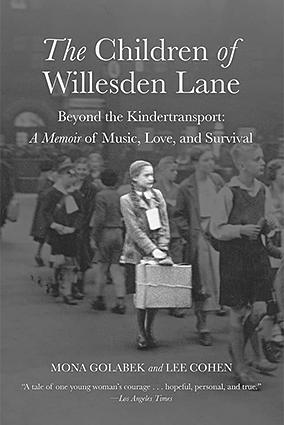
Set in Vienna in 1938 and in London during the Blitzkrieg, The Children of Willesden Lane tells the true story of Lisa Jura, a young Jewish musician who is dreaming about her concert debut at the storied Musikverein concert hall. When new ordinances are issued under the Nazi regime, everything changes for Lisa, except her love of music and the pursuit of her dream.
If you would like to check out a copy of The Children of Willesden Lane, please visit the Kripke-Veret Collection of the Jewish Federation of Omaha! You can read the full story at www.omahajewishpress.com
The exhibit immerses viewers in Anne Frank's family life before, during, and after World War II. Juxtaposed against the horrors of the Nazi regime, passages from Anne's diary showcases her enduring sense of hope and unwavering belief in a bright future. A partnership between the University of South Carolina's College of Education, Anne Frank House, and the Institute for Holocaust Education has made it possible for the traveling exhibit to travel to schools throughout Nebraska.
Be sure to visit the upcoming community night at Lewis and Clark Middle School in Bellevue, which will be hosting
their community night on March 21. Students will lead tours to community and general public from 5:30 -7 p.m.
On March 21st at 11:30 a.m. by Zoom, two law students from Creighton University Law School will speak about their experiences attending last summer’s, From Nuremburg to the Hague, program.
Creighton’s Nuremberg Summer Program, From Nuremberg to The Hague gives law students an opportunity to learn firsthand about the Holocaust in Nuremberg, the Bavarian city that hosted the Nazi war crimes trials after World War II and is considered the birthplace of modern international criminal law.
For more information regarding Third Thursday programming at IHE, or to RSVP for a program, please reach out to Scott Littky, Executive Director of IHE, at slittky@ihene.org
Time’s Echo is a new genre-blurring book on music, war and memory that has been named History Book of the Year by The Sunday Times and hailed as “the outstanding music book of this and several years” by The Times Literary Supplement. Published by Knopf in North America and Faber in the U.K., Time’s Echo was a finalist for the UK’s premier non-fiction prize and is being translated into eight languages.

As the living memory of the Second World War fades, Time’s Echo proposes new ways of listening to history, and learning to hear between its notes the resonances of what another era has written, heard, dreamed, hoped, and mourned. A lyrical narrative full of insight and compassion, this book deepens how we think about the legacies of war, the presence of the past, and the renewed promise of art for our lives today.
The Institute for Holocaust Education provides educational resources, workshops, survivor testimony, and integrated arts programming to students, educators, and the public. The IHE provides support to Holocaust survivors in our community. To donate to our mission, please visit our website at ihene.org
If you do business with any of our advertisers, please tell them you saw their ad in the Jewish Press. It really helps us!

In October of 1983, the Nebraska Jewish Historical Society published its second newsletter ever (volume 1, number 2!) and included were letters from community members, both current and former, because that’s what people did back then: they wrote letters! We hope you enjoy this small trip down memory lane.
“Thanks for sending me the NJHS newsletter. It made me realize that Omaha is where my roots are, no matter that I’ve lived here longer than in Omaha. I think the NJHS is a wonderful idea and I will be proud to be a member.”
FRAN BLACKER KOOLISH, Phoenix, Arizona
“My wife and I would like to become charter members. Even though we do presently live east of Council Bluffs, we assume we can still ‘qualify’ for membership!”
DAVID M. GRADWOHL, Ames, Iowa
“Your organization seems to have gotten off to a good start. I wish you all continued success.”
JOSEPH LEVINE, Indiana Jewish Historical Society
“NJHS is a wonderful idea and I hope includes saving the ‘shul’ on Cuming Street. The records in the shul must give lots of really interesting and important information about members and families. The basement bookshelves are full of books brought from communities that no longer exist, but reveal a great deal about the people who brought them.”
ALVIN L. ROSS, Omaha
“My great-uncle, Louis Poska, settled in Lincoln when there were only 2-3 Jews there. After that, little by little, the Arensons, Gordons, Poskas and Polskys came. My grandfather Gordon was the hazen, mohel and schocket in Lincoln from the early 1880s until he retired (about 1940). My cousin, W.H. Davidson of Lincoln said he was giving the Society our grandfather’s knives.”
ELAINE ARENSON, Philadelphia, PA
“My wedding (57 years ago) was the first held in the just completed JCC on 20th and Dodge.”
JEANETTE ALBERTS, Portland, Oregon Visit us at omahajewishpress.com
The essay, titled The Early History of the Jewish Home for the Aged in Omaha, Nebraska was submitted to the first Morris C. Fellman Essay Competition in 1983, and in 1984 it was reprinted in the NJHS newsletter. We are reprinting a portion of the story here.
ALLAN GREENE
In 1910, an auxiliary of the synagogue Chevra B’nai Israel was organized and became known as the Daughters of Israel Aid Society.
In 1912, the Society decided to establish a home for the aged and a mikvah. A lot with [a] house on it, located at 25th and Charles, was purchased for $5,000. The alterations, an additional erection of one mikvah, cost an additional $2,200. The mikvah was opened in 1917 and the home itself in 1918. Mr. Samuel Ravitz and Mr. Sam Newman served as a building committee.
The home itself was a two-story frame building with five rooms on the first floor and six rooms on the second. The first floor had two bedrooms with a capacity of five beds, a living room, dining room, kitchen and a bathroom. Males generally occupied these rooms.
The upstairs rooms housed the staff, usually an older married couple and the mikvah attendant. There were two bathrooms upstairs. One room was used as an isolation room for a resident who
was ill. The other three rooms were used for three femal residents. Residents at the home were known as “inmates.”
In addition to the residents at the home, three basement rooms of the mikvah housed residents as well. These were not desirable rooms because of the cement floors and the heat from the nearby boiler.
The staff of the home consisted of an older couple who resided with the residents and who received $40 a month, plus maintenance through the early 1920s. A maid who came in daily received $6 per week and a janitor to attend the furnace in the winter received $1.50 per week. The mikvah attendant received $30 a month and maintenance. She was permitted to live at the house with her daughter. They shared a bedroom on the second story and used one of the basement rooms in the mikvah house during the day.
had time to attend to their collection. The home was invited to become a constituent member of the Jewish Welfare Federation in 1921. A coordinating committee, comprised of representatives of the Federation and the Israel Aid Society

was constituted to handle the executive administration of the affairs of the home.
Three meals a day were served: breakfast at 7 a.m., dinner (lunch) at 12 and supper at 5 p.m. Old newspapers frequently served as tablecloths. In the afternoon, fruit or tea was served.
Dues for the Society were $3 per year and funds were collected as the officer
In its first ten years of operation, the home served 37 people, admitting two or three a year with a maximum of 11 persons at any one time. It cost about $1.50 per day or $500 per year to care for each resident in 1928. Of the first 37 residents, seven were cared for entirely free, seven residents had paid a lump sum of $300 to $500, and the remainder paid an arbitrary amount ranging from $3.00 to $60.00 a month for their care.



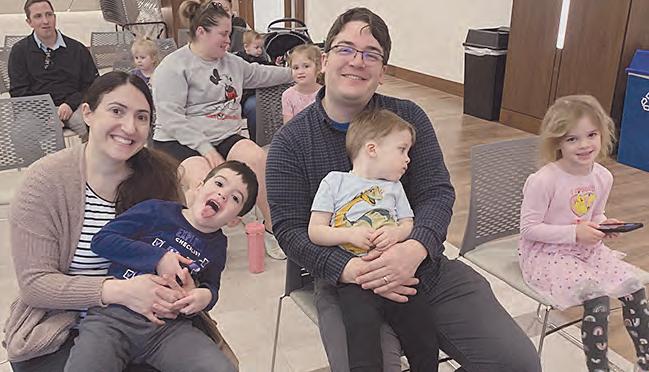

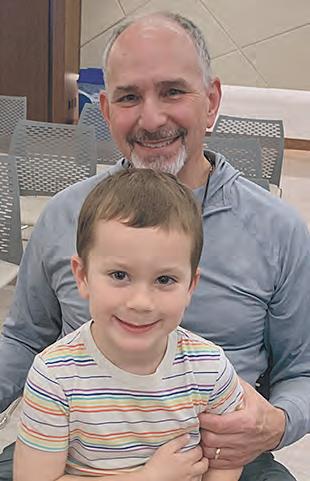

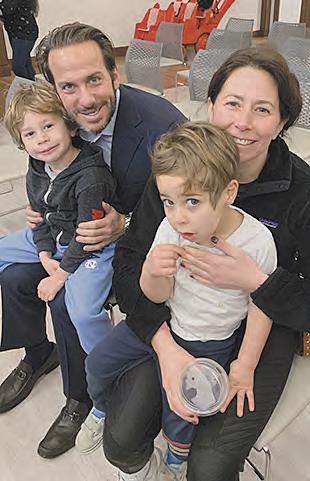
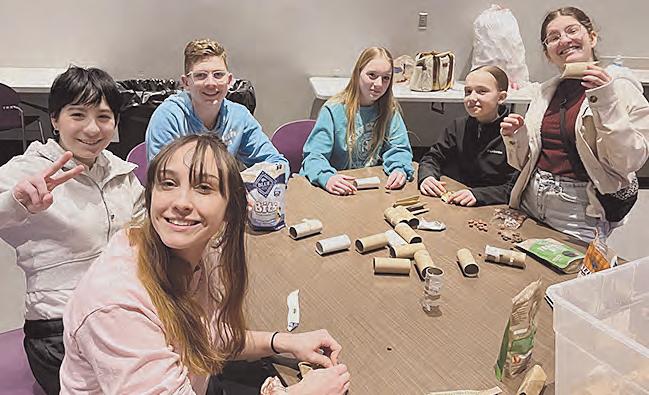

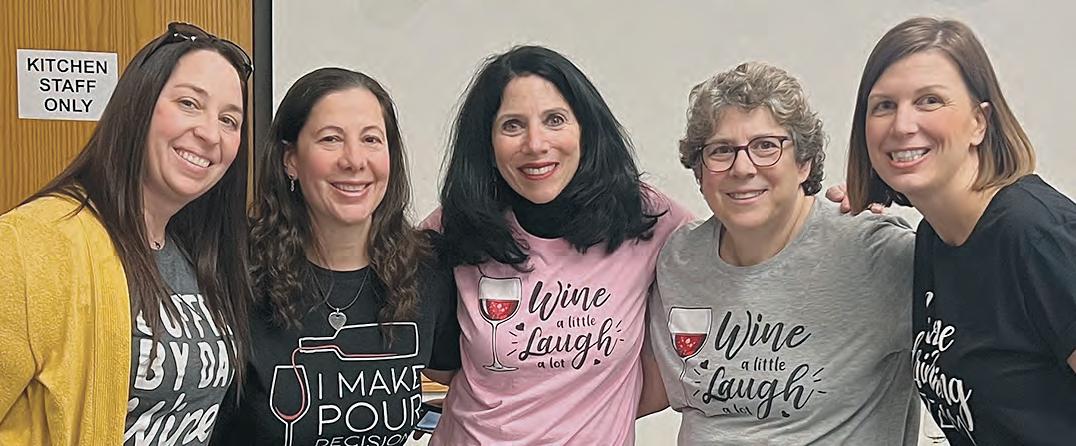
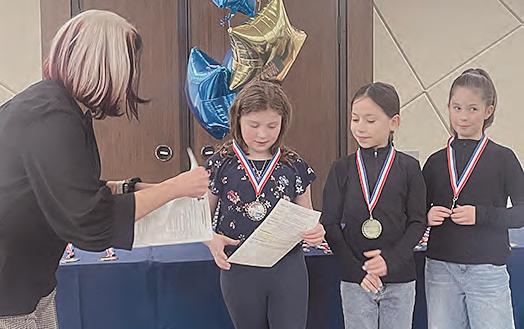

SUBMIT A PHOTO: Have a photo of a recent Jewish Community event you would like to submit? Email the image and a suggested caption to: avandekamp@jewishomaha.org
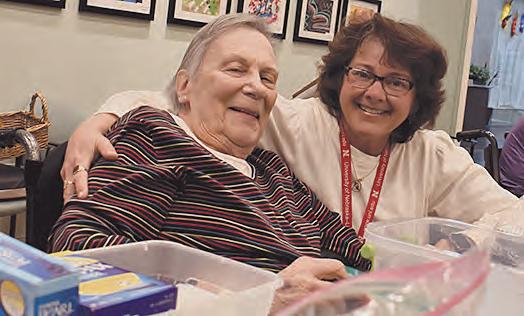
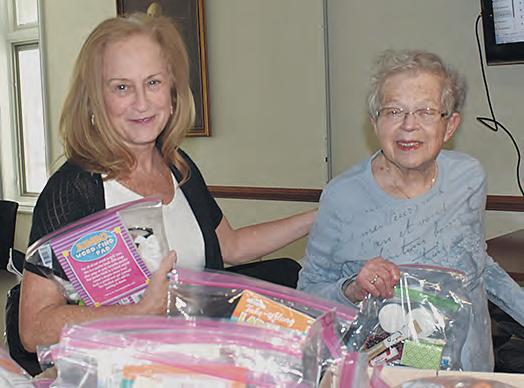
Above: RBJH Resident Annette Fettman had some lovely visitors recently. She met great-granddaughter, Naomi Myers, for the first time – she’s 12 years old, from Israel. Since Annette participated with other Residents in the Residents Give Back Project, Annette handed over the 70 bags of toiletries to Teresa Drelicharz, Jewish Family Service Executive Director for the Tzedakah project.
Below: Teresa Drelicharz, JFS Executive Director; left; Annette Fettman; Aviva Schwab(Annette’s daughter); Naomi Myers; and Renana Gross (Annette’s daughter).
GENEROUSLY SUPPORTED BY
Left and below: “Giving Back” started with selling strawberry ceramics as a fundraiser to family members and guests of RBJH, which surprisingly raised $250. Residents wanted to give back to the Jewish and Omaha communities by making essential hygiene kits. Christina Caniglia, Assistant Activities Director, encouraged the Jewish community to clean out their drawers for this cause. She asked for a wish list of travel size products such as toothpaste/ brushes, deodorant, tissue and Chapstick and the community did not disappoint. One person alone donated 170 toothbrushes along with a whole host of toiletries. With Christina’s enthusiasm and leadership, Residents made over 120 packages to be delivered to the Jewish Family Service Tzedakah Program and a North Omaha Church serving the homeless and needy. RBJH Residents and staff want to thank all those who made this lovely program so successful. Kindness is contagious!
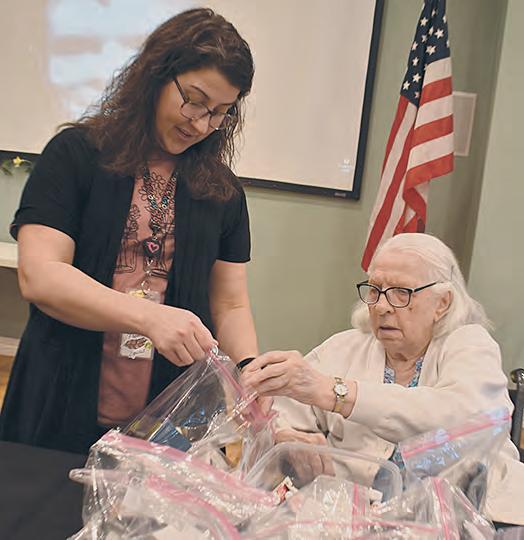

December 11, 1986
Elie Wiesel, the author, lecturer and humanitarian who has devoted most of his life’s work to bearing witness to the Holocaust, received the 1986 Nobel Peace Prize Wednesday and, in his acceptance speech, urged help for the Palestinian people, for whom terrorism was no answer.
He also linked the internal exile of Soviet dissident Andrei Sakharov, the denial of polish Solidarity leader Lech Walesa’s right to dissent, and the imprisonment of Black South African civil rights leader Nelson Mandela as “disgrace” of identical magnitude.

“Human rights are being violated on every continent. More people are oppressed than free,” the 58-year-old Wiesel, a survivor of Auschwitz, told the assembled dignitaries from all parts of the world. “And then, too, there are the Palestinians to whose plight I am sensitive but whose methods I deplore,” Wiesel said.
“Violence and terrorism are not the answer. Something must be done about their suffering and soon,” he said. “I trust Israel, for I have faith in the Jewish people. Let Israel be given a chance, let hatred and danger be removed from her horizons, and there will be peace in and around the Holy Land.”
Wiesel added, “It would be unnatural for me not to make Jewish priorities my own: Israel, Soviet Jewry, Jews in the Arab lands. But there are others as important... Apartheid is, in my view, as abhorrent as anti-Semitism... Wherever men or women are persecuted because of their race, religion or political views, that place must... at that moment... become the center of the universe.”
Wiesel, born in Romania and now a U.S. citizen, heads the United States Holocaust Memorial Council. He is credited with being the first to use the term “Holocaust” to describe the Nazi extermination of six million Jews. He said he plans to use the $250,000 Nobel Prize money to establish a Human
Rights Foundation, the first act of which would be to organize a conference on combatting hatred.
When he was a teenager, Wiesel was sent with his father, Shlomo, to the Buna Werke labor camp, a sub-camp of Auschwitz III-Monowitz. They were forced to work for eight months before being transferred to a series of other concentration camps near the war’s end. Wiesel’s father starved to death.
Egil Aarvik, chairman of the Norwegian Nobel Committee, said in presenting the Peace Prize to Wiesel that it was given “In recognition of this particular human spirit’s victory over the powers of death and degradation and as a support to the rebellion of good against evil in the world.”
Wiesel said at a press conference before the award ceremonies that he was optimistic about his forthcoming meeting
with Soviet leader Mikhail Gorbachev to discuss easing restrictions on the emigration of Jews and non-Jews from the USSR.
Elie Wiesel died at the age of 87 in 2016. “The State of Israel and the Jewish People bitterly mourn the passing of Elie Wiesel,” Israeli Prime Minister Benjamin Netanyahu said in a statement Saturday. “Elie, the wordsmith, expressed through his extraordinary personality and fascinating books the triumph of the human spirit over cruelty and evil. Throughout the dark period of the Holocaust, in which our six million brethren perished, Elie Weisel was a beacon of light and an example of humanity that believes in man’s inherent good.”
The Archive of the Jewish Telegraphic Agency includes articles published from 1923 to 2008. Archive stories reflect the journalistic standards and practices of the time they were published.
•
•
•
Requirements:
•
•
•
•
Interested?

Phil and Ruth Sokolof MERIT SCHOLARSHIP
For two Jewish students …who are college-bound high school seniors.
Scan to apply today!

Phil and Ruth Sokolof MERIT SCHOLARSHIP
For two Jewish students …who are currently enrolled in or have been admitted to a course of study at the graduate school level, such as medicine, nursing, dentistry, occupational/physical therapy, or pharmacy.
Applications found online by scanning QR code above or visiting www.jewishomaha.org
Applicants must be from the Omaha metropolitan area.
APPLICATION DEADLINE: APRIL 1, 2024



Karen Sokolof Javitch MUSIC SCHOLARSHIP
Merit scholarship for Jewish students currently in college or graduate school majoring in or pursing a degree in music performance, composition or music education. Cantorial students are eligible.
82 Omaha Jewish Students have received $900,000 since 2006
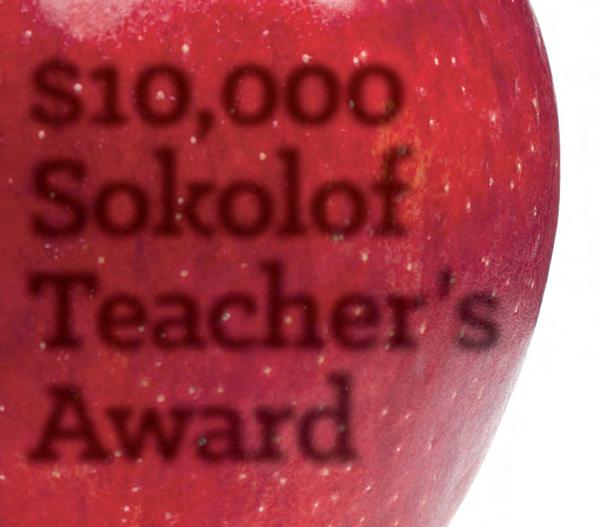


contact Diane Walker, Jewish Federation of Omaha Foundation at 402-334-6551 or dwalker@jewishomaha.org

(Founded in 1920)
Margie Gutnik
President Annette van de Kamp-Wright
Editor
Richard Busse
Creative Director
Howard Kutler
Advertising Executive
Lori Kooper-Schwarz
Assistant Editor
Gabby Blair
Staff Writer
Sam Kricsfeld
Digital support
Mary Bachteler
Accounting
Jewish Press Board
Margie Gutnik, President; Abigail Kutler, Ex-Officio; Helen Epstein; Andrea Erlich; Seth Feldman; David Finkelstein; Ally Freeman; Mary Sue Grossman; Chuck Lucoff; Suzy Sheldon; Joseph Pinson and Larry Ring.
The mission of the Jewish Federation of Omaha is to build and sustain a strong and vibrant Omaha Jewish Community and to support Jews in Israel and around the world. Agencies of the JFO are: Institute for Holocaust Education, Jewish Community Relations Council, Jewish Community Center, Jewish Social Services, Nebraska Jewish Historical Society and the Jewish Press Guidelines and highlights of the Jewish Press, including front page stories and announcements, can be found online at: www.jewishomaha.org; click on ‘Jewish Press.’ Editorials express the view of the writer and are not necessarily representative of the views of the Jewish Press Board of Directors, the Jewish Federation of Omaha Board of Directors, or the Omaha Jewish community as a whole. The Jewish Press reserves the right to edit signed letters and articles for space and content. The Jewish Press is not responsible for the Kashrut of any product or establishment.
Editorial
The Jewish Press is an agency of the Jewish Federation of Omaha. Deadline for copy, ads and photos is: Thursday, 9 a.m., eight days prior to publication. E-mail editorial material and photos to: avandekamp@jewishomaha.org ; send ads (in TIF or PDF format) to: rbusse@jewishomaha.org
Letters to the Editor Guidelines
The Jewish Press welcomes Letters to the Editor. They may be sent via regular mail to: The Jewish Press, 333 So. 132 St., Omaha, NE 68154; via fax: 1.402.334.5422 or via e-mail to the Editor at: avandekamp@jewishomaha.org.
Letters should be no longer than 250 words and must be single-spaced typed, not hand-written. Published letters should be confined to opinions and comments on articles or events.
News items should not be submitted and printed as a “Letter to the Editor.”
The Editor may edit letters for content and space restrictions. Letters may be published without giving an opposing view. Information shall be verified before printing. All letters must be signed by the writer. The Jewish Press will not publish letters that appear to be part of an organized campaign, nor letters copied from the Internet. No letters should be published from candidates running for office, but others may write on their behalf.
Letters of thanks should be confined to commending an institution for a program, project or event, rather than personally thanking paid staff, unless the writer chooses to turn the “Letter to the Editor” into a paid personal ad or a news article about the event, project or program which the professional staff supervised. For information, contact Annette van de Kamp-Wright, Jewish Press Editor, 402.334.6450.
Postal
The Jewish Press (USPS 275620) is published weekly (except for the first week of January and July) on Friday for $40 per calendar year U.S.; $80 foreign, by the Jewish Federation of Omaha. Phone: 402.334.6448; FAX: 402.334.5422.
Periodical postage paid at Omaha, NE.
POSTMASTER: Send address changes to: The Jewish Press, 333 So. 132 St., Omaha, NE 68154-2198 or email to: jpress@jewishomaha.org
“Joy is central to connecting to G-d,” Chabad.org states. “Being happy when you do a mitzvah demonstrates that you like this connection, this tremendous privilege of serving the Infinite
Author of All Things. And in fact, the Arizal, 16th-century master Kabbalist, once asserted that the gates of wisdom and divine inspiration were opened for him only as a reward for doing mitzvahs with boundless joy.”
During Purim, too, we are commanded to be joyful. How do we do that while our world has been shaken? This year, we ourselves are the grogger.
And yet, the calendar will not spare us: Purim is here, whether we like it or not. It’s funny, when we need it the most, we were given an extra month, maybe to help us prepare.
forbid us to also keep sadness in our hearts.
So what do we do this weekend?
STEP ONE: Find a costume. Always fun in Omaha Nebraska, where unless you planned ahead and shopped the sales after Halloween, costumes aren’t
at work (I know, I’m lucky) or at your synagogue or at your friend’s house, go celebrate with others. Eat something fun, sing, dance. Joy may be central to this holiday, but friends and family are central to joy.

Celebrating during times of tragedy, it’s kind of our super power. Don’t we always celebrate ‘in spite of?’
The answer lies in the and/and concept. We don’t approach this as a black-and-white choice; we don’t get to be either one or the other. Sadness, pain and melancholy are part of us along with joy and happiness. We can feel multiple things at the same time, the commandment to be joyful doesn’t
that easy to find. Of course, there’s Amazon (one day shipping!) but if you’re like me, you could possibly still forget until the last moment. Luckily, it’s okay to be a little goofy, so you can just go into your closet, find the most mismatched outfit and call it good.
STEP TWO: Hear the Megillah. Really hear it. Pay particular attention to what happens to Haman. Remind yourself who comes out on top.
STEP THREE: Find a party to go to. Whether it’s
STEP FOUR: Eat ALL the hamantaschen. Remember, you don’t get these the rest of the year and you’ll regret not indulging by about the third day of Passover. Even if the ones you encounter don’t have your favorite filling, even if they are a little dry, eat them!
Often, the biggest roadbloack to joy is permission. As in, we don’t give ourselves permission to enjoy things. We have rules, about what we shouldn’t do, what we shouldn’t say, eat, feel. Remember the story about drinking so much during Purim that you can’t tell the difference between Mordechai and Haman? I don’t recommend drinking to that level, but there’s a deeper lesson here about letting go of some restrictions we put on ourselves. This Purim, let’s give ourselves permission to be joyful, to be sad, to be upset and relieved, to not care and care too much, to eat, drink, to dress like a unicorn and wear that crazy pink wig. Let’s have that second cookie, that third Megillah reading, say yes. Yes to joy, and yes to feeling all of it all at once.
Happy Purim!
For every looted Schiele, there are countless looted Jewish artifacts.
JTA
In 2021, a leather-bound book dating from the second part of the 19th century came up for sale at a New York auction house, together with other similar works. Originally from the Jewish community in Oradea in today’s Romania, the ledger listed Jewish burials in the city between 1836 and 1899. A page on display listed, in elegant Hebrew calligraphy, the names of those who passed away.
One of them is identified simply as Tova Esther, the “daughter of Leah,” who died on the fifth day of the month of Kislev in the Hebrew calendar. How did this precious book reach New York in 2021? Alarmed that a pre-war treasure of Romanian Jewry may have been looted by the Nazis and passed through private hands before coming up for auction, the World Jewish Restitution Organization — which I lead — together with the Romanian Jewish community approached U.S. authorities to ensure that the auction house call off the sale until its provenance could be determined.
What other paintings, books and kiddush cups that tell the story of a family and represent the history of a people lie today behind closed doors and in private homes?
Twenty-five years ago, in a very different world, over 40 countries adopted the Washington Conference Principles on Nazi-Confiscated Art. They laid out first steps to create an international understanding on how to best deal with the problem of Nazi-looted art. It was the beginning of a journey that has affected the way that we look at issues of ownership, history and transparency in the world of art and cultural property. But the journey is not yet completed.
A gathering in Washington last week took stock of progress and at the same time charted new directions forward. Under the leadership of the United States, 23 countries came together to endorse a set of best practices and to invite other countries to endorse them. Notably, the gathering included a focus on looted Holocaust-era art and cultural property that is today in the hands of private individuals.
We have seen great progress over the past 25 years, but there is clearly much to do. As a global
report released last week shows, while claims processes are now in place in many countries, the numbers of cases handled and resulting restitutions often remain low. Five of the 47 countries surveyed in the report have established restitution commissions to facilitate claims, but the overwhelming majority of countries still do not have one. Overall, 24 countries have made little or no progress in implementing the Washington Conference Principles.
The new best practices adopted this month call on governments to encourage projects that will make available on the internet not only public but also private archives. “Public and private collections should be encouraged to publish their inventories,” the governments urge. The records of dealers and others that facilitate the art market can hold the key to unlocking the past. Privacy is a value we all share, but so too is the quest for justice.
And, as we are increasingly discovering, artwork and artifacts that belonged to families and to Jewish communities before the Holocaust are not just in the great museums around the world; many also ended up in private homes.
Lack of transparency, long a hallmark of the international art trade, stymies the efforts of those

Our attention tends to be drawn to high profile cases of looted paintings by luminaries like Pablo Picasso and Egon Schiele hanging in storied museums across the world.
But this is also a story of drawings, of silver kiddush cups and musical instruments and libraries. It is about items that are often of limited financial value but of immeasurable historical significance to families and to the Jewish people. For every renowned masterpiece that was taken during the Holocaust, there are hundreds of lesser-known works and religious artifacts. They came from great cities, from small towns, and from tiny villages. Some were created by people whose famous names roll off our tongues, and others by anonymous craft workers toiling in obscurity in their studios.
Why do they matter? Because they bring us closer to lives that were destroyed and to memories that were lost. They represent the heart of a family, the heritage of a community, the soul of a people. They tell us where we came from and who we are.
that are seeking the return of the art and cultural property that belonged to families and Jewish communities. The search for history often runs into the roadblock of privacy and secrecy. And that is frequently where the trail runs cold.
The memory of Tova Esther belongs to her family, and to the Jewish people — not to a private individual. We must seek not only the restitution of property but also the restitution of history.
At a time when we as a society are increasingly examining the origins of items of art and culture, this is a moment that calls for us to shed light on the darker chapters of history and to promote openness amidst opacity.
Gideon Taylor is president of the World Jewish Restitution Organization.
The views and opinions expressed in this article are those of the author and do not necessarily reflect the views of JTA or its parent company, 70 Faces Media.
This story was originally published on My Jewish Learning | BERLIN JTA
I did not grow up celebrating International Women’s Day, a global holiday established by the United Nations in 1977 that is observed annually on March 8. I became aware of it only upon moving to Europe, where it is widely celebrated and, in some countries, a national holiday.
In Berlin, Women’s Day is a statutory holiday akin to New Year’s Day or the Fourth of July. People don’t go to work and shops are closed. In my local Jewish community, the majority of which has roots in the former Soviet Union, presenting women with flowers on Women’s Day is part of the culture. (This may be because, according to the U.N., the observed date of March 8 has its roots in a women’s protest against the Russian czar in 1917.)
were the first to come to Moses, and [afterwards] they brought with them those men with whom they found ornaments. For the phrase al hanashim indicates that they were there first, while the men joined them later.
I read this with cynicism at first. The mishkan is essentially the first Jewish home; of course women were leading the charge. The text is simply reflecting the classic stereotypes we still have about women — as lovers of jewelry and devoted to homemaking. How could I possibly read this as exemplary women’s leadership when it’s really about women giving, sewing and doing even more?

Personally, I’ve had my share of uphill battles as a woman. I was often the sole woman in my workplace in the years following college graduation, and I pursued rabbinic ordination from the first institution to offer it to Orthodox women in the U.S. I’m interested in celebrating women’s achievements, but how might we do that without being overly performative or political?
The Book of Exodus is full of rare gems of exemplary women’s leadership in the Torah, and this week’s Torah portion is no exception. In fact, Parashat Vayakhel, which focuses (in often excruciating detail) on the construction of the mishkan, the traveling sanctuary the Jewish people built to serve God while wandering in the desert, offers a hint about how to celebrate women in a genuine way.
Exodus 35:22 tells us: “And the men came along with the women, all whose hearts moved them, all who would make an elevation offering of gold to God, came bringing brooches, earrings, rings, and pendants — gold objects of all kinds.” The Torah uses some strange language to describe male and female participation, saying the men came al hanashim — literally translated as “on the women,” or more figuratively, along with them.
The strangeness of the language sparks questions from the commentators. The medieval commentator Rashi clarifies that the men and women didn’t come forward in an equal way, but rather the men came closely following the women. Writing a century later, the Catalan scholar Ramban takes this a step further:
The meaning of this expression [men and women] is that because donations of ornaments were more common amongst women, and they all had these jewels, therefore they immediately pulled off their ear-rings and signet-rings and
But on closer look, the women’s activity has a different quality. This was perhaps the first documented act of Jewish women’s philanthropy. Based on the Ramban’s reading, we see women immediately identifying shareable sources of wealth and eagerly donating to the common cause of building a house in which God can dwell. The cause itself excited them enough to become the primary financiers of the project.
These women teach us how to understand what is precious. The construction of the mishkan was a wondrous aesthetic production, but it’s also the first instance of the newly formed Jewish nation coming together to create a shared sacred space. The women recognize the deeper gift God has given in those lengthy, exacting instructions — the chance to be nediv lev, generous of heart, not just on behalf of one’s self, but on behalf of the entire people.
Our generation is one that sees substantial levels of women’s philanthropy. In the Jewish community, we have stellar examples of women’s giving, from the women’s organization Hadassah, to activism in local Jewish federations, to more grassroots giving circles. Research indicates that women are more likely to give of themselves to benefit others, whether financially or by simple acts of kindness. Our tradition reminds us that it was precisely this trait that led women to intuitively support the building of our first holy house.
So on this Women’s Day, I celebrated this generosity of heart modeled for us by Jewish women wandering in the desert. And of course, I extended my gratitude to all the women in my life who have, to date, taught me about what’s truly precious in our lives.
Rabbi Rebecca Blady is executive director of Hillel Germany and co-founder of Base Berlin, an initiative of Hillel International supported by Genesis Philanthropy Group, European foundations, and individual donors.
The views and opinions expressed in this article are those of the author and do not necessarily reflect the views of JTA or its parent company, 70 Faces Media.
JTA
In the wake of the Oscars, Hollywood has been treated to a rare spectacle: Jewish communal leaders attacking the Jewish director of an award-winning Holocaust movie.
The Anti-Defamation League and an organization representing Holocaust survivors are among those now angry with Jonathan Glazer, the British Jewish filmmaker behind the widely acclaimed drama The Zone of Interest, which is set in Auschwitz. During his acceptance speech Sunday for best international feature, Glazer denounced the “occupation” and “dehumanization” that he said has led to loss of life in both Israel and Gaza — and connected it to a lesson that he said his own film tried to teach.
“Our film shows where dehumanization leads at its worst. It’s shaped all of our past and present,” Glazer read from his prepared remarks. “Right now we stand here as men who refute their Jewishness and the Holocaust being hijacked by an occupation which has led to conflict for so many innocent people, whether the victims of October the 7th in Israel or the ongoing attack on Gaza.”
He went on to say that they are “all the victims of this dehumanization,” and asked, “How do we resist?” He concluded by dedicating his Oscar to a real-life Polish resistance fighter who was depicted in the film.
Glazer’s comparing of the “dehumanization” of the Holocaust to the Israel-Hamas war has not sat well with many institutional Jewish and pro-Israel leaders. Their reactions point
to a deeper division within the Jewish community, which has only grown since Oct. 7, over when and how to link the Holocaust to Israel.
“You made a Holocaust movie and won an Oscar. And you are Jewish. Good for you. But it is disgraceful for you to presume to speak for the six million Jews, including one and a half million children, who were murdered solely because of their Jewish identity,” David Schaecter, president of the Miamibased Holocaust Survivors’ Foundation USA, wrote in an open letter to Glazer on Monday.
Schaecter, a Holocaust survivor himself, also called Glazer’s message “factually incorrect and morally indefensible” and said that Israel “has nothing to do with the Holocaust.” He claimed Glazer was trying to “equate Hamas’ maniacal brutality against innocent Israelis with Israel’s difficult but necessary self-defense in the face of Hamas’s ongoing barbarity.”
His comments were echoed almost word-for-word by the Anti-Defamation League, which posted on X, formerly Twitter, “Israel is not hijacking Judaism or the Holocaust by defending itself against genocidal terrorists. Glazer’s comments at the Oscars are both factually incorrect & morally reprehensible. They minimize the Shoah & excuse terrorism of the most heinous kind.”
As a new generation of artists looks to interpret the Holocaust, Glazer’s approach — to both his speech and the film itself — has touched a raw nerve among Jews.
There is more to read about this at www.omahajewishpress.com.
In 1945 President Truman was faced with invading the Japanese home land and killing a million American troops or dropping the Atomic bomb which would kill about a million Japanese civilians and bring an end to the war. People said it was ”immoral” that innocent civilians were killed. BB Netanyahu, off the tracks as many believe, was faced with a similar problem: either destroy Hamas or risk thousands of Israeli lives. Hamas could surrender its relatively small army, about seven battalions, which were safe in the tunnels they built, or sacrifice their civilian population. They chose to use the Palestinian people as cannon fodder for their own political goals.
The Oct. 7, 2023, raid on Israel was an attack on the Israeli Defense Forces (IDF), which Hamas knew to be a hornet’s nest. The attack came on a Jewish holiday and was designed to be heinous, such as raping women and decapitating their babies in front of them. Hamas did everything to fire up the IDF, who were far superior to their forces. This was not a raid to obtain land. This was a raid to ensure that the IDF demolished most of the buildings in Gaza and killed thousands of innocent people to make Israel to look at fault.
In the years leading up to this attack, money was funneled into Gaza which could have turned Gaza into a modern Mediterranean resort, good for all the people in the region. Instead, Hamas was fueled by hatred and ignorance. They were educated to believe that Israel occupied land that was originally theirs, when in fact the land was never theirs. It was originally settled by the ancient Hebrews. Jerusalem was built over 3000 years ago during the reign of King David, centuries before Islam was born. Through the centuries, Palestine was not controlled by Arabs, but by Persia, Greece, Babylonia, Rome, Turkey, and later Great Britain. The Arabs began to populate the area known as Palestine (a Roman word) after prosperous Western European Jewish philanthropists began to buy land for the Jews of Eastern Europe who were living in poverty and faced with frequent raids resulting in murder and rape. Israel became their escape.
When the land began to develop, it became attractive to people other than poverty stricken Jews from Russia. Immigration records show many people from the Middle East and Northern Africa came to this desert land with nothing to offer after Palestine became prosperous.
It was the United Nations that gave Great Britain a mandate to control land on the eastern edge of the Mediterranean, which had no natural resources and was mostly desert. The nation occupied by the Jewish people escaping from the Nazi Holocaus, became Israel. The Israeli people may not be perfect, and the nation is controlled by a rightwing government that many feel should be changed. Imperfect as Bibi Netanyahu is, he never launched commando raids on Palestinian villages; decapitating babies in front of their mothers and raping the women.
Gaza, run by Hamas, had every opportunity to use the money received from outside sources to become a major resort and commercial center and become prosperous. Instead they took the billions of dollars that was given to them and built a series of expensive tunnels so that Hamas fighters would be safe from any war they started. Instead of tunnels, they could have built subways and infrastructure and made Gaza into a city like Singapore. More important, Hamas knew that fighting would result in thousands of civilian casualties including their own relatives. Hamas used the Palestinians as human shields and cannon fodder in the same way that the Russian czars used enlisted men in the czar’s armies. All Hamas wants to do is fuel hatred.
The raid on the hornet’s nest falls on Hamas, who sacrificed their own family and friends. Hamas has lost this war, brought on by their own hatred and ignorance, and it is time they surrender.
They may not get a plate of strudel, but they will be treated with dignity and fairness.
Announcements may be e-mailed to the Press at jpress@jewishomaha.org; or mailed to 333 So. 132 St., Omaha, NE 68154. Readers can also submit announcements -- births, b’nai mitzvahs, engagements, marriages, commitment ceremonies or obituaries -- online at www.omahajew ishpress.com/site/forms/. Deadlines are normally nine days prior to publication, on Wednesdays, 9 a.m. Please check the Jewish Press, for notices of early deadlines.
B’NAI ISRAEL SYNAGOGUE
618 Mynster Street
Council Bluffs, IA 51503-0766
712.322.4705 www.cblhs.org
BETH EL SYNAGOGUE
Member of United Synagogues of Conservative Judaism 14506 California Street Omaha, NE 68154-1980
402.492.8550
bethel-omaha.org
BETH ISRAEL SYNAGOGUE
Member of Union of Orthodox Jewish Congregations of America 12604 Pacific Street Omaha, NE. 68154
402.556.6288
BethIsrael@OrthodoxOmaha.org
CHABAD HOUSE
An Affiliate of Chabad-Lubavitch
1866 South 120 Street Omaha, NE 68144-1646
402.330.1800
OChabad.com
email: chabad@aol.com
LINCOLN JEWISH COMMUNITY: B’NAI JESHURUN
South Street Temple Union for Reform Judaism
2061 South 20th Street Lincoln, NE 68502-2797
402.435.8004
www.southstreettemple.org
OFFUTT AIR FORCE BASE
Capehart Chapel 2500 Capehart Road Offutt AFB, NE 68123 402.294.6244
email: oafbjsll@icloud.com
ROSE BLUMKIN JEWISH HOME
323 South 132 Street Omaha, NE 68154
TEMPLE ISRAEL
Union for Reform Judaism (URJ)
13111 Sterling Ridge Drive Omaha, NE 68144-1206 402.556.6536 templeisraelomaha.com
LINCOLN JEWISH COMMUNITY:
TIFERETH ISRAEL
Member of United Synagogue of Conservative Judaism
3219 Sheridan Boulevard Lincoln, NE 68502-5236
402.423.8569 tiferethisraellincoln.org
Monthly Speaker Series Service, Friday, April 12, 7:30 p.m. with our guest speaker, Scott Littky. Our service leader is Larry Blass. Everyone is always welcome at B’nai Israel!
For information about our historic synagogue, please visit our website at www.cblhs.org or contact any of our other board members: Renee Corcoran, Scott Friedman, Rick Katelman, Janie Kulakofsky, Howard Kutler, Carole and Wayne Lainof, Ann Moshman, Mary-Beth Muskin, Debbie Salomon and Sissy Silber.
Handicap Accessible.
Services conducted by Rabbi Steven Abraham and Hazzan Michael Krausman.
IN-PERSON AND ZOOM MINYAN SCHEDULE:
Mornings on Sundays, 9:30 a.m.; Mondays and Thursdays 7 a.m.; Evenings on Sunday-Thursday 5:30 p.m.
FRIDAY: Nebraska AIDS Project Lunch, 11:30 a.m.; Kabbalat Shabbat, 6 p.m.
SATURDAY: Shabbat Morning Service 10 a.m. at Beth El & Live Stream; Jr. Congregation (Grades K-12), 10 a.m.; Mahjong Shabbat following Services and Kiddush Lunch; Havdalah & Megillah Reading 8 p.m.
SUNDAY: BESTT (Grades K-7), 9:30 a.m.; Megillah Reading, 10 a.m.; Purim Carnival, 11 a.m.
MONDAY: Women’s Book Group, 2 p.m. we will discuss The Emerald Necklace by Linda Rosen.
WEDNESDAY: BESTT (Grades 3-7), 4:15 p.m.; Hebrew High (Grades 8-12), 6 p.m.
FRIDAY-Mar. 29: Kabbalat Shabbat, 6 p.m.
SATURDAY-Mar. 30: Shabbat Morning Service 10 a.m. at Beth El & Live Stream; Jr. Congregation (Grades K-12), 10 a.m.; Kiddush Lunch sponsored by Janie Kulakofsky following services; Havdalah 8:25 p.m. Zoom Only. Please visit bethel-omaha.org for additional information and service links.
FRIDAY: Nach Yomi, 6:45 a.m.; Shacharit, 7 a.m.; Candlelighting/Mincha/Kabbalat Shabbat, 7:22 p.m.
SATURDAY: Shabbat Kollel, 8:30 a.m.; Shacharit, 9 a.m.; Tot Shabbat 10:30 a.m.; Youth Class 10:45 a.m.; Kids Kiddush Club, 11:15 a.m.; Soulful Torah: Unpacking the Or HaChayim’s Teachings, 6:21 p.m.; Mincha/Ma’ariv 7:10 p.m.; Laws of Shabbos/Kids Activity, 7:40 p.m.; Havdalah, 8:21 p.m.
SUNDAY: Shacharit 9 a.m.; Kinyan HaMasechta, 9:40 a.m.; Purim Celebration, 3 p.m.; Mincha/Ma’ariv 7:30 p.m.
MONDAY: Nach Yomi, 6:45 a.m.; Shacharit, 7 a.m.; Monday Mind Builders, 4 p.m.; Mincha/Ma’ariv, 7:30 p.m.
TUESDAY: Nach Yomi, 6:45 a.m.; Shacharit, 7 a.m.; Kinyan HaMasechta before Mincha/Ma’ariv; Mincha/ Ma’ariv, 7:30 p.m.
WEDNESDAY: Nach Yomi, 6:45 a.m.; Shacharit, 7 a.m.; Mincha/Ma’ariv, 7:30 p.m.
THURSDAY: Nach Yomi, 6:45 a.m.; Shacharit, 7
a.m.; Character Development Class, 9:30 a.m.; Kinyan HaMasechta following Mincha/Ma’ariv.; Mincha/ Ma’ariv, 7:30 p.m.; Parsha Class, 7:50 p.m.; FRIDAY-Mar. 29: Nach Yomi, 6:45 a.m.; Shacharit, 7 a.m.; Candlelighting/Mincha/Kabbalat Shabbat, 7:29 p.m.
SATURDAY-Mar. 30: Shabbat Kollel, 8:30 a.m.; Shacharit, 9 a.m.; Tot Shabbat, 10:30 a.m.; Youth Class 10:45 a.m.; Kids Kiddush Club, 11:15 a.m.; Soulful Torah: Unpacking the Or HaChayim’s Teachings, 6:25 p.m.; Mincha, 7:20 p.m.; Laws of Shabbos/Kids Activity 7:50 p.m.; Havdalah, 8:31 p.m.
Please visit orthodoxomaha.org for additional information and Zoom service links.
All services are in-person. All classes are being offered in-person and via Zoom (ochabad.com/academy). For more information or to request help, please visit www.ochabad.com or call the office at 402.330.1800.
FRIDAY: Shacharit 8 a.m.; Inspirational Lechayim, 5:45 p.m. with Rabbi and friends: Ochabad.com/ Lechayim; Candlelighting, 7:21 p.m.
SATURDAY: Shacharit, 9:30 a.m. followed by Kiddush and Cholent; Shabbat Ends, 8:21 p.m.
SUNDAY: Purim All Day, 9 a.m.-5 p.m. at Chabad; Sunday Morning Extreme, 9 a.m.-noon; Purim in Five Minutes, noon-5 p.m.
MONDAY: Shacharit 8 a.m.; Personal Parsha, 9:30 a.m.; Intermediate Biblical Hebrew Grammar, 10:30 a.m. with Prof. David Cohen; Parsha Reading, 6 p.m. with Prof. David Cohen.
TUESDAY: Shacharit, 8 a.m.; Intermediate Biblical Hebrew Grammar, 6 p.m. with Prof. David Cohen; Introductory Biblical Hebrew Grammar, 7 p.m. with Prof. David Cohen.
WEDNESDAY: Shacharit 8 a.m.; Mystical Thinking (Tanya), 9:30 a.m.; Introductory Biblical Hebrew Grammar, 10:30 a.m. with Prof. David Cohen; Parsha Reading, 11:30 a.m. with Prof. David Cohen.
THURSDAY: Shacharit, 8 a.m.; Advanced Biblical Hebrew Grammar, 11 a.m. with Prof. David Cohen; Talmud Study (Sanhedrin 34), noon; Introduction to Alphabet, Vowels & Reading Hebrew, 6 p.m. with Prof. David Cohen; Kitzur Shulchan Aruch (Code of Jewish Law) Class, 7 p.m.
FRIDAY-Mar. 29: Shacharit 8 a.m.; Inspirational Lechayim, 5:45 p.m. with Rabbi and friends: Ochaba d.com/Lechayim; Candlelighting, 7:28 p.m.
SATURDAY-Mar. 30: Shacharit 9:30 a.m. followed by Kiddush and Cholent; Shabbat Ends, 8:29 p.m.
LINCOLN JEWISH COMMUNITY:
B’NAI JESHURUN & TIFERETH ISRAEL
Services facilitated by Rabbi Alex Felch. All services offered in-person with live-stream or teleconferencing options.
FRIDAY: Erev Shabbat Service with Rabbi Alex, 6:30 p.m. at SST; Shabbat Candlelighting, 7:23 p.m.
SATURDAY: Shabbat Morning Service, 9:30 a.m. at TI; Torah Study noon on Parashat Vayikra; Havdalah,
JACKIE HAJDNEBERG
JTA
A recent conference marking 25 years since the adoption of international standards for restituting Nazi-looted artwork presented a new set of best practices on the issue that have been adopted by more than 20 countries.
The best practices, set out by the World Jewish Restitution Organization, or WJRO, and the Conference on Jewish Material Claims Against Germany, aim to “enhance” the 1998 Washington Principles on Nazi-Confiscated Art.
The Washington Principles are a non-binding set of 11 guidelines on how to approach artwork that was stolen from Jews by the Nazis. They were adopted in 1998 by 44 countries and are credited with establishing norms around how countries should work to restitute the stolen pieces. Now, 21 other countries have signed on to the new standards.
In recent years, some of those efforts have paid off, as a swath of Nazi-looted art has been returned to the heirs of the original owners around the globe. But many of those restitutions occurred following
court battles, which art provenance researchers say is an inefficient method of restitution that can take years. The issue of Nazi looting also drew attention last year when Christie’s auctioned off much of a large collection of jewelry that was linked to Nazi plunder.
But along with the best practices document, the WJRO and Claims Conference published a report detailing the status of arts and cultural property restitution across 47 countries. That report found that while seven countries have made major progress in art and cultural property restitution, 24 countries have made minimal to no progress.
The report also found that relatively significant progress has been made with items held in public collections and museums, but not as much when it comes to items formerly owned by individuals or communities that are now in private hands.
The updated best practices document, presented at a March 5 conference hosted by the WJRO and U.S. State Department, provides a more explicit manual for how countries can implement the original principles without going through the courts.
“The Best Practices were drafted with the aware-
8:24 p.m.; Community Purim Celebration, 6:30-8:30 p.m. at SST.
SUNDAY: No LJCS Classes; Men’s Bike/Coffee Group, 10:30 a.m. in the Conference Room at Rock 'n Joe (5025 Lindbergh St.). For more information or questions please email Al Weiss at albertw801@ gmail.com; Pickleball, 3-5 p.m. Anyone interested in playing or learning how to play can text Miriam at 402.470.2393. If there are enough interested people; we will play in the Social Hall at TI.
TUESDAY: Ladies' Lunch, 1 p.m. at Hiro 88, 56th and Old Cheney. For more information email Barbara Barron at oohhmmm.barb@gmail.com.
WEDNESDAY: LJCS Hebrew School, 4:30-6 p.m.; Jewish Themes Through Jewish Films, 6:30 p.m. at SST.
THURSDAY: Lincoln Jewish Community Fellowship Night, 5:30-8 p.m. at 3810 Stockwell St.
FRIDAY-Mar. 28: Erev Shabbat Service with Rabbi Alex, 6:30 p.m. at SST; Shabbat Candlelighting, 7:31 p.m.
SATURDAY-Mar. 30: Shabbat Morning Service, 9:30 a.m. at TI; Torah Study noon on Parashat Tzav; Havdalah, 8:31 p.m.
FRIDAYS: Virtual Shabbat Service, 7:30 p.m. every first and third of the month at Capehart Chapel. Contact TSgt Jason Rife at OAFBJSLL@icloud.com for more information.
The Rose Blumkin Jewish Home’s service is currently closed to visitors.
In-person and virtual services conducted by Rabbi Benjamin Sharff, Rabbi Deana Sussman Berezin, and Cantor Joanna Alexander
FRIDAY: Drop in Mah Jongg, 9-11 a.m. In-Person; Classic Shabbat Service, 6 p.m. In-Person & Zoom; Teen Lock-In for Grades 9-12, 8 p.m.
SATURDAY: Torah Study 9:15 a.m. In-Person & Zoom; Shabbat Morning Service, 10:30 a.m. In-Person & Zoom; Bowling Bash — Adult Purim Party, 6 p.m. at Bob & Willie’s Wonderbowl (RSVP Required).
SUNDAY: Purim Spiel, 9:30 a.m.; Purim Carnival, 10 a.m.
WEDNESDAY: Yarn It, 9 a.m. In-Person; Grades 36, 4:30 p.m. In-Person; Grades 8-12 Teen Beit Midrash 6 p.m. at Beth El In-Person.
FRIDAY-Mar. 29: Drop in Mah Jongg, 9-11 a.m. InPerson; Shabbat B’yachad Service, 6 p.m. In-Person & Zoom.
SATURDAY-Mar. 30: Torah Study, 9:15 a.m. In-Person & Zoom; Shabbat Morning Service, 10:30 a.m. InPerson & Zoom. Please visit templeisraelomaha.com for additional information and Zoom service links.
ness that there are differing legal systems and that states act within the context of their own laws,” Stuart Eizenstat, the U.S. Secretary of State’s special advisor on Holocaust issues and a central figure in drafting the original principles, said in a statement. “While they are legally non-binding, they are morally important and, as with the Washington Principles, will advance art restitution.”
The new best practices document specifies that works sold under duress during the Holocaust are considered looted or confiscated by the Nazis. It also says governments should encourage provenance researchers to make their findings public, and that institutions should provide access to any relevant archives or documents that could help in provenance work.
The best practices also say governments should create independent expert bodies to adjudicate these cases and avoid litigation, something the Netherlands has done in recent years. And the document says countries should make it easier legally for works that are hanging in state-owned and private collections to be returned to their original owners or their descendants.
BENJAMIN KUSHNER
Benjamin Kushner, beloved musician and friend adored by all, died on March 11, 2024 in Lincoln, Nebraska, after a fierce battle with cancer. He was 59. Funeral services, led by Rabbi Elliott Tepperman, were held March 13, 2024 at Tifereth Israel Synagogue.
A Lincoln native, Benjie spent his childhood running around the Sheridan Boulevard neighborhood, causing trouble, and making friends. This energy and loving nature followed him into his teen years, and beyond. His high school years at Lincoln Southeast were characterized by performances in plays, musicals, and other groups. He graduated with a BA in English from the University of Wisconsin-Madison.
Upon returning to Lincoln, Benjamin spent the next decades playing with and forming bands such as The Millions, The SelfRighteous Brothers, The Mezcal Brothers, Josh Hoyer and Soul Colossal, The Wondermonds, and more. He made a community and home out of downtown Lincoln.
Benjie toured Europe with The Millions, opening for Sheryl Crow. He played in Northern Europe and Scandinavia with The
Mezcal Brothers, followed by European tours with Josh Hoyer and Soul Colossal. He toured extensively throughout the United States, building lifelong friendships everywhere he went.
Despite cancer setting him back time and again over the last seven years, Benjie always found his footing, returning to live shows and touring. He found a particular purpose in reaching audiences through music and was committed to spreading love, always. Benjie's keen intellect and curiosity about the world brought him into connection with kindred spirits everywhere, and his bright nature filtered through every song he played.
He was preceded in death by his father, Sheldon Kushner, he is survived by his mother, Marcia Kushner; his life-and-loving partner Karmin Stanosheck; daughters Marina and Neva Kushner; Karmin's daughters, Zeneya and Amiya Coleman; siblings, Cathy, Julie, and Michael Kushner and their spouses, David Lindholm, Larry Morgan and Diane Bush; and his two cats, Prince and Baby Bird.
In lieu of flowers, donations may be sent to the Nebraska Cancer Network, or a charity of your choosing. Condolences: www.bmlfh.com
PARSHA TZAV
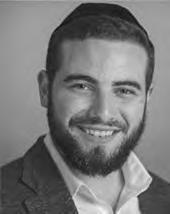 RABBI MORDECHAI GEIGER Beth Israel
RABBI MORDECHAI GEIGER Beth Israel
How many of us remember the following scene from when we were kids (or maybe just yesterday)? You come home and want to make your mom happy, so you decide to take out the trash. As you decide to do this glorious good deed, your mom calls, “Johnny, is that you? Would you please take out the trash”? I bet you kicked the trash can in a mad huff; how dare she ask this of me!?” Since high school, I have been passionate about exercise. Gym class, not as much. Even when we got a good workout, it was a workout
I was forced to do, not one I chose to do. So often, when we are asked or told to do something, it automatically becomes a burden.
At the end of this week’s parsha (Leviticus 8-36), the Kohanim (priests) are praised for doing what G-d told them to do. Based on the Gur Aryeh, I would suggest that the praise is not just that they did it but that they put their heart into it. Instead of being resentful that G-d was asking something of them, they realized it was an opportunity. Unlike mom or dad, G-d did not need anything from them. He was giving the Jewish people an opportunity to connect with Him. If that is how we view our service to G-d, it will transform our emotional world from resentment to love and excitement. You can even test this at home. Next time you say yes to a favor, smile and say, “Yes, because I love you.” See what happens.
Advice for Life, a six-week course offered by Chabad through the Rohr Jewish Learning Institute (JLI) is set to debut this Spring. This immersive journey explores the extensive written communications of the Lubavitcher Rebbe, Rabbi Menachem Mendel Schneerson, of blessed memory. Through thousands of typewritten letters and transcripts of spoken discourse, the Rebbe interacted with individuals of all walks of life, both from within and outside the Jewish community on matters of work, family, health, and well-being.
The Rebbe’s spiritual leadership is the force behind the modern Chabad movement and his wisdom continues to inspire and guide countless individuals on their journeys of faith and personal growth. Join us at the JCC Monday, April 8 at noon-1 p.m., for a multimedia voyage through the Rebbe’s insights on daily life. Discover how the Rebbe applied Jewish values to serve as a guide for finding deeper meaning in everyday life. Complimentary Kosher lunch will be provided thank you to Gary and Lisa Epstein.
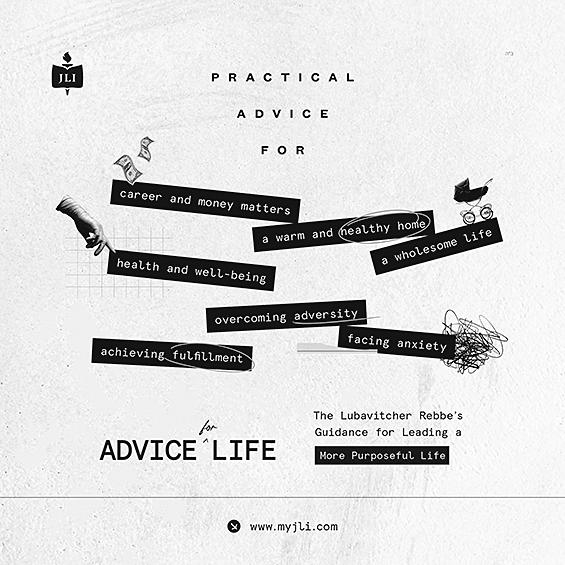
From navigating the “daily grind” to cultivating thriving relationships, the Lubavitcher Rebbe’s guidance offers invaluable insights for wholesome living. “Advice for Life is an
TO SUBMIT ANNOUNCEMENTS
Announcements may be e-mailed to the Press at jpress @jewishomaha.org; or mailed to 333 So. 132 St., Omaha, NE 68154. Readers can also submit announcements -- births, b’nai mitzvahs, engagements, marriages, commitment ceremonies or obituaries -- online at www.omahajewishpress. com/site/forms/. Deadlines are normally nine days prior to publication, on Wednesdays, 9 a.m. Please check the Jewish Press, for notices of early deadlines.
invitation to delve into ideas that guide us toward mindful growth,” notes Rabbi Eli Tenenbaum, a dedicated JLI instructor in Nebraska, “This course provides practical insights that elevate everyday experiences to meaningful milestones.”
Advice for Life welcomes participants from all backgrounds and levels of knowledge, embodying JLI’s commitment to making enriching Jewish educational experiences accessible to all.
For registration and additional information about the course, interested individuals can contact 402.330.1800 or visit www.OChabad.com/ AFL. The course is presented in partnership with Jewish Federation of Omaha. Sponsored in loving memory of Alan Biniamow.
Discounted rate for employees and board members of local Jewish institutions.
JLI, the adult education arm of Chabad-Lubavitch, operates in over 800 locations across the U.S. and various countries worldwide. Since its establishment in 1998, JLI has reached more than 400,000 students, providing them with valuable insights and transformative educational experiences.




ANNOUNCEMENT
ADVERTISE STATEWIDE for $225/25 word classified ad. Over 140 newspapers with circulation of more than 237,000. Contact the Jewish Press or call 1-800-369-2850.
HELLO NEBRASKA! Introducing www.nepublicnotices.com, a new public notice website presented as a public service by all Nebraska newspapers. Free access, fully searchable – because democracy depends upon open government and your right to know.
AFFORDABLE PRESS Release service. Send your message to 155 newspapers across Nebraska for one low price! Call 1-800369-2850 or www.nebpress.com for more details.
BUSINESS FOR SALE
CENTRAL NEBRASKA Wholesale Popcorn/Kettle Corn Manufacturing and Snack Distribution Business serving Nebraska, South Dakota, Kansas and Wyoming. Inquire at kettlecornsnacks2016@gmail.com.
CRAFT SHOW
SPRING CRAFT show. March 23, 9 a.m. - 2 p.m. Sutton Comm. Center, 200 S. Saunders, Sutton. Lots of great vendors, clothing boutiques, food trucks.
FOR SALE – AGRICULTURE
MERIDIAN SEED Tenders Models 225 and 240 on hand. Replacement parts including auger flighting, conveyor belting, electric auger tip up kits. TAG Sales and Service. 1-402-560-8508 hellerichgary@gmail.com.
FOR SALE - SENIORS
PORTABLE OXYGEN Concentrator? May be covered by Medicare! Reclaim independence and mobility with the compact design and long-lasting battery of Inogen One. Free information kit! Call 855-385-3580.
HOME SERVICES
DOES YOUR basement or crawl space need some attention? Call Thrasher Foundation Repair! A permanent solution for waterproofing, failing foundations, sinking concrete and nasty crawl spaces. FREE Inspection & Same Day Estimate. $250 off ANY project with code GET250. Call 1-844-958-3431.
INFLATION IS at 40 year highs. Interest rates are way up. Credit Cards. Medical Bills. Car Loans. Do you have $10k or more in debt? Call NATIONAL DEBT RELIEF and find out how to pay off your debt for significantly less than what you owe! FREE quote: Call 1-888-353-0702.
JTA
Jewish high school students are looking for more than just an active Greek life or Ivy prestige when they put together a short-list of colleges to apply to.
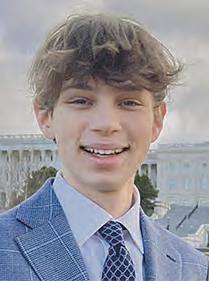
As the Jewish Telegraphic Agency’s Jacob Gurvis reported recently, real and perceived antisemitism on campus is a big factor for many teens deciding where to spend the next four years. The Hamas attacks of Oct. 7 and the subsequent war have made colleges and universities hotbeds of pro-Palestinian and anti-Zionist activism, which critics on and off campus have said often cross the line into antisemitism.
Such incidents have inspired a new set of criteria for Jews applying to colleges. Are colleges “safe spaces” for Jewish students? Do they have the critical Jewish infrastructure to make students feel they are not alone? Are there policies in place to ensure a healthy learning environment for all students, and do the administrations enforce them?
JTA asked seniors to share with us what their college application rollercoaster has been like this year.
‘I need assurance that the schools will
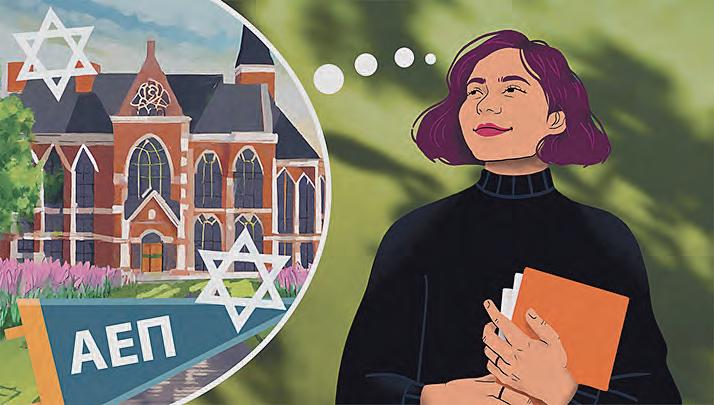
respond with action’
JOSH JURY, 18, Homewood, Illinois
One of my top college choices is George Washington University. I love the lively city campus, the prestigious international relations programs and, especially, the school’s incredible and active chapter of Hillel. As a Jewish teen, identifying colleges with a functional Hillel has been an important criterion in my college selection process.
But when I heard that the university’s library was defaced with projections of antisemitic messages in October, I felt dismayed and disturbed. Just months prior I had toured the very building that was now utilized as a canvas for hate. In my eyes, the university’s initial response and condemnations weren’t strong enough to evoke comfort for a Jewish
teen. With an uptick in antisemitism on college campuses, I need assurance that the schools won’t just respond with statements, but with action. Belonging to an academic environment that is safe for Jewish students is a college criterion that I can’t compromise.
I soon learned that the surging antisemitism on campus was not exclusive to GWU, but rather an addition to a growing list of incidents at numerous other universities in which I’d shown interest or toured. This includes Tulane, where extremist protestors assaulted Jewish students, and the University of Tampa, which became the target of a federal investigation due to growing antisemitic incidents on campus.
I’ve always imagined myself going to college directly after high school, but the soaring antisemitism and the inaction of universities have led me to take another path — the Aardvark Gap Year in Israel. The gap year program offers an opportunity for me to grow inde-
pendent, take on internships aligned with my passions and gain college credits that could be utilized once I apply to schools next fall.
This past semester I saw the impacts of studying abroad in Israel first-hand. I was enrolled in a high school study-abroad program in Israel and loved the ability to be proudly and safely Jewish in an academic space. The day the Israel-Hamas war began, my classmates and I were woken by blaring sirens and rushed to a bomb shelter. Despite the grim news from southern Israel, it was the holiday of Simchat Torah and my teachers and counselors attempted to maintain a sense of normalcy around the holiday. Seeing the country I had spent two months in now torn by war was unimaginable, but I found strength in my school community. I returned to the states a week into the war and in the middle of my fall semester of my senior year. My dream of studying abroad in a Jewish safe space was shattered as our program was forced to an end, but the inspiration that got me there remained.
When I returned to the U.S. amidst the ongoing war in Israel, I was hurt seeing some of my prospective colleges failing to combat the hatred toward Jewish students. I hope in the time of my gap year, George Washington University and others will have a better grip on antisemitism and take tangible action to protect Jewish students. And even if nothing changes, at least I can rely on my time studying in a Jewish space that will give me the resources and agency to feel confident on their campuses.
